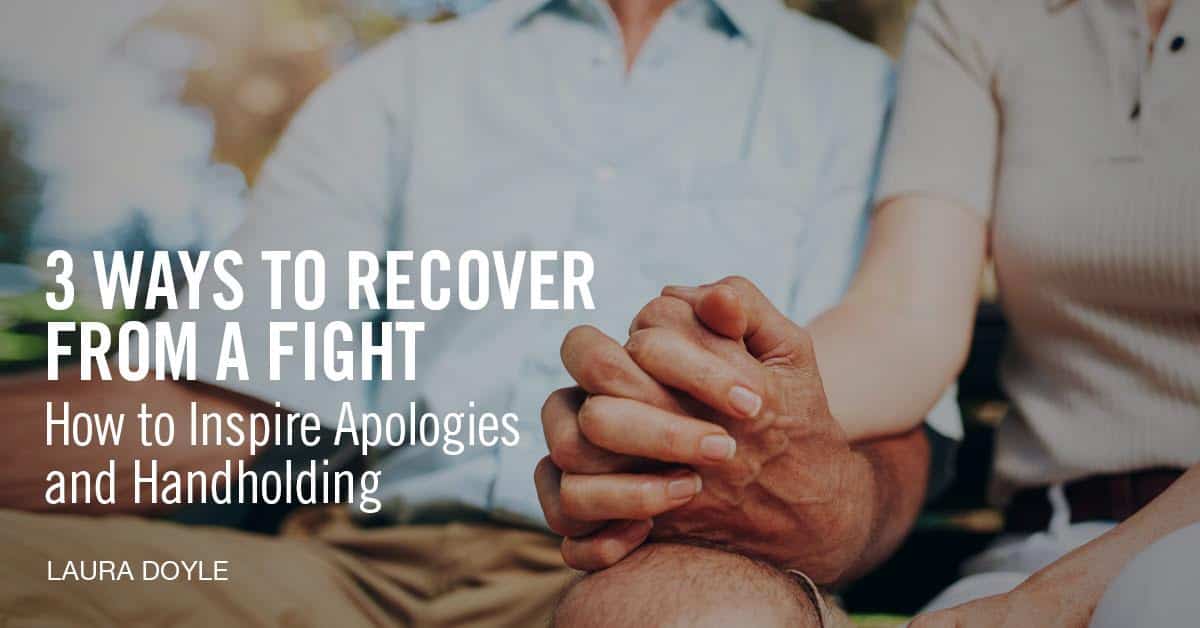3 Ways to Recover from a Fight

If you’re anything like I was, some fights come up in your relationship more often than a hit song plays on Top 40 radio.
You don’t want to have the same fight over and over, but it keeps happening.
You’re just talking about the leftovers from dinner and next thing you know, your mother–who isn’t present–is involved, and you’re both yelling things you would be embarrassed to repeat.
You wonder why he has to yell and get so upset when the conversation was originally about Tupperware.
It makes you question whether this relationship is even sustainable because it’s so draining and painful to have these blow-ups. And so distracting from the things you were planning to do because you keep replaying the fight in your head and thinking of ways to let him have it.
Happily, you don’t have to stay stuck in wall-to-wall hostility or a week-long cold war.
Here are 3 ways to recover quickly from a big fight.
Contents
1. Look at His Intentions
Wedding vows tend to be lofty. You promise never to hurt the other person, for example. But in my experience, it’s just not possible.
Perhaps the wedding vows should say, “I’ll never hurt you intentionally.”
I think of the time my husband rolled over in bed and smacked my jaw with his elbow, for starters. Accidentally, of course.
Because we’re mere mortals who live together, we accidentally hurt each other emotionally sometimes too.
That was so discouraging early in my marriage because it was happening a lot, so I thought that something was seriously wrong with our relationship. I felt a lot of shame that two well-educated people could descend into ugly name-calling so fast and so often.
I assumed that if you really loved each other, you wouldn’t have the terrible fights we had, so I figured I should probably not tell other people this was going on.
Since then, I’ve learned the Intimacy Skills that have made our home very peaceful (not to mention learning how valuable it is to tell other people what’s going on so I don’t feel like the only couple who has terrible fights). Now it’s been well over a decade since we had a big fight.
I also came to see–and this was key–that when my husband hurts me, it’s never, ever intentional.
It may seem like your husband is intentionally trying to hurt you when he swears at you and calls you the worst names he can think of. But what if he’s not?
What if he’s just trying to shore up his own ego because he feels threatened? When people are hurt or scared, there’s a good chance they’ll lash out at you to make themselves feel better.
I’m not saying it’s right or okay. I’m just saying it wasn’t because he got up that morning planning to hurt you. That was not his intention.
Whenever I think my husband is behaving badly, I know it’s because hurt people hurt.
That doesn’t mean I have to like it when I think he’s being a jerk. But reminding myself of his intentions does help me soften and remember that we’re on the same team. Which helps with this next idea.
2. Get Out the Street Sweeper
Full disclosure: This is my favorite way to recover from a fight quickly because I am a rebellious, contrary person who enjoys watching other people’s heads explode.
You might find it enjoyable also.
It’s an unfair advantage to do this after a fight, but it’s not always easy. Rather, it’s surprising. And using the element of surprise can be perversely pleasurable.
After a fight, if I’m willing to look I can usually find something I said or did that I regret–something that was not a reflection of me at my best.
It could have been the part where I called my husband a loser-pants, for example.
Regrettable.
And if I am willing to apologize for saying that, it’s like pouring fairy dust on the whole situation in terms of putting things right.
The first few times you apologize for being disrespectful, it will cause his eyes to pop out of his head. He’ll look startled. You’ll wonder if he’s having a medical emergency.
Now that such perversity is usual and customary at my house, I don’t often get that reaction anymore, but you still can. It’s fun.
Today, when I apologize for my part he usually apologizes too or apologizes first. (My head probably exploded when that started happening also.)
But either way, my side of the street is squeaky clean. So even if he were to continue to give me the stink eye after my apology, I would know I’d taken the high road and that my side of that road was spotless, which nurtures the peace and intimacy around here.
And I still get pleasure by feeling very, very smug about that.
3. Get a Relationship Coach
All human beings need to be heard and understood. If things are unresolved and there’s a break in the action, it can be very tempting to reopen the “discussion” (read: fight) to scratch that itch.
You could instead reach out to a friend or sister so you can feel heard without contributing to more conflict in your relationship.
Then you get to express yourself without making your partner even more defensive, causing more distance between you, or saying things you’d need to break out that street sweeper for again.
Of course, there’s a danger of making your partner look like the bad guy to your friend or sister, and people who love you want to protect you from bad guys. So the next time you talk to that friend or relative, she may be taking your side against him. Or telling you to leave that no-good jerk.
She means well, but that’s no way to help you get over the fight fast.
The great thing about having a coach to help you recover from a fight instead is that she can listen and still stand for your greatness–and for the greatness of the man you chose. She’s trained to do that.
She knows that you want to be a happy wife and that you wouldn’t be so committed if you didn’t believe that it were possible.
When the big fight is fresh on your mind, she’s going to empathize, of course (she was in a relationship that was once falling apart too), but also stand for your vision and help you get to where you stop feeling frustrated, lonely and overwhelmed and start feeling special, desired and taken care of.
Which of these will you try the next time you have a big fight? Share your thoughts in the comments section below.


5 replies on “3 Ways to Recover from a Fight”
Get out the sweeper I say and do a lot of hurtful things I just want peace, peace of mind.
This was truly truly great insight in bringing awareness to not only myself but to an understanding of what my husband’s feeling too.
This is great. Thank you, as always, for inspiring me. I had a thought this week; it would be great to have a journal/workbook with prompts everyday for the skills. I think that would really help me out. Thank you.
It is very frustrating when you have learned how to fight productively or communicate productively but your spouse is still a brick wall. :-/
Wow that’s great Idea,
Will see how fast that works
Thanks alot for such a solution